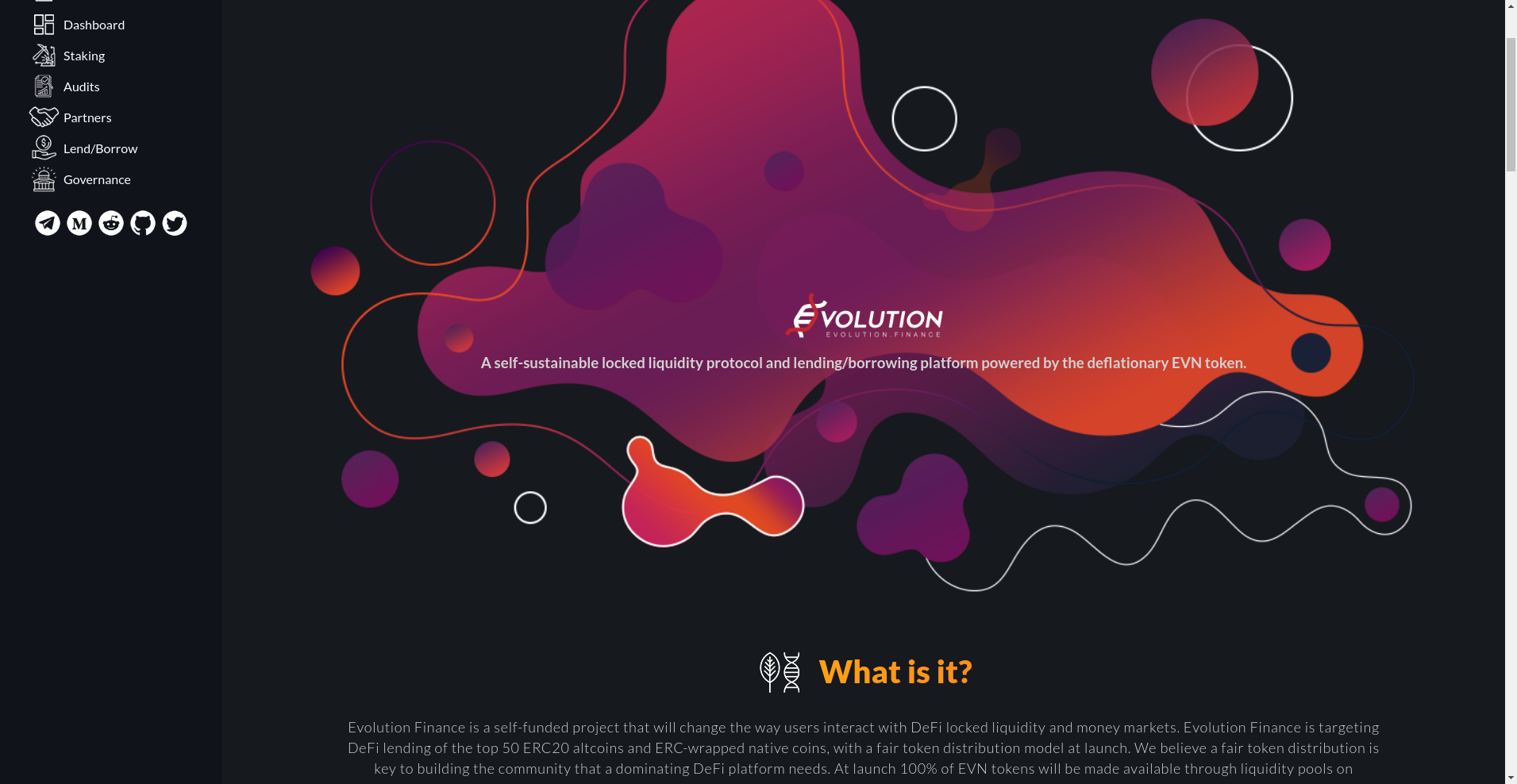Evolution Finance ($EVN) Review: A Data-Driven Assessment of Its Legitimacy and Risks

What Is Evolution Finance: An Introduction
Evolution Finance is a DeFi project that positions itself as a self-sustainable, governance-driven protocol focused on providing secure liquidity, lending, and borrowing solutions within the Ethereum ecosystem. Its core offering revolves around the EVN token—a deflationary asset designed to underpin its ecosystem and incentivize user participation.
The project emphasizes its strategic partnerships, security features, and innovative tokenomics as key differentiators. Its stated goal is addressing current DeFi flaws, particularly around liquidity management, fair distribution, and ecosystem security. This review provides an impartial analysis of its strengths, vulnerabilities, and long-term viability based on available data and technical audits.
The Team and Vision Behind Evolution Finance
Based on the provided information, Evolution Finance’s team comprises known partners and advisors rather than anonymous founders. Notable collaborators include:
- Blockchain Strategy Team (BST): Experienced in blockchain ecosystem design since 2017, with team members involved in crypto since 2011, and a track record of launching top projects.
- DAO Maker: Specializes in community social mining and DAO infrastructure, providing social liquidity mechanisms and governance integrations.
- Ferrum Network: Responsible for crafting secured smart contracts for liquidity—bringing a background in structured DeFi tech solutions.
- Cipherblade: Blockchain forensic firm with FBI-recognized expertise in investigating hacks and scams, enhancing security trustworthiness.
- HBK GoChain: Focused on enterprise and regional adoption, aiming to foster crypto solutions in the Middle East.
While this roster lends credibility—given the experience and specialized backgrounds—there remains a lack of public-facing, detailed bios or whitepaper transparency about individual roles. The governance and decision-making process seem to be managed through multi-sig controls during initial phases, with plans for decentralization.
Roadmap assessments are limited in available documentation, but the outlined partnerships and focus on security and fair tokenomics suggest a strategic long-term vision.
Assessing the Security and Integrity of Evolution Finance
The institutional strength of a DeFi project is often reflected in its security audits and audit transparency. Based solely on the Cer.live audit, here are the key points:
- Audit Coverage: 80%, performed by Arcadia Group, a recognized DeFi audit firm.
- Audit Score and Findings: The project's smart contracts received a rating of 5.1 out of 10, indicating moderate security posture. Certain incidents or vulnerabilities are flagged, though the specifics are not detailed publicly.
- Incidents: The audit notes that security incidents have occurred, highlighting potential vulnerabilities or past exploits.
- Audit Transparency: While a formal audit report exists online via DefiYield, the moderate score suggests users should maintain caution, especially given the complexity of DeFi security.
- Additional Security Measures: The project emphasizes multi-sig wallets, smart contract cover, and credible third-party audits to bolster trust.
However, it’s important to recognize that only one major audit source is publicly available. The moderate rating and incident history signal that, despite rigorous efforts, vulnerabilities or exploitable issues could remain. As with many DeFi projects, thorough due diligence and continuous security monitoring are recommended for potential stakeholders.
A Breakdown of Evolution Finance Tokenomics
EVN tokenomics underpin the ecosystem's economic sustainability. The token features a fixed supply and is designed to be deflationary, with all tokens unlocked at inception to ensure fair distribution. Here are critical elements:
- Total Supply: Fixed, with token supply released 100% at launch.
- Distribution: No fundraises, pre-mine, or team allocation—tokens are entirely provided via liquidity pools on Uniswap at launch, ensuring decentralization and transparency.
- Vesting & Allocation: All tokens are initially unlocked, emphasizing a fair launch approach. No specific vesting schedules are detailed for team or investors.
- Utility: EVN tokens facilitate fee redistribution, staking rewards, and arbitrage profit sharing. A 1.7% transfer fee is levied with designated allocations to liquidity providers and stakers.
- Economic Model Risks: While fixed supply and fair launch promote decentralization, reliance on continuous trading volume and fee redistribution keys mean the project’s value depends heavily on active ecosystem participation.
In essence, the tokenomics aim to create a self-sustaining, community-driven economy. The absence of early fundraisers mitigates some risks of centralization but could pose challenges for initial liquidity and marketing. The deflationary aspect aligns incentives for long-term holding but might also limit liquidity if not managed carefully. Understanding the specific fee redistribution model is key to grasping its economic engine. The impact of such fees on broader DeFi ecosystems is also a critical consideration, prompting an look at the general impact of transfer fees on DeFi trading volume.
Assessing Evolution Finance's Development and Ecosystem Activity
On the surface, the project's website and associated social channels indicate ongoing development and community engagement. Active links are provided for:
- Telegram and Reddit for community discussions.
- Medium for project updates and articles.
- Github for code transparency and releases.
However, a critical technical issue is evident: multiple `TypeError: Failed to fetch` errors appear across the platform, especially within the staking page. These errors suggest API or backend connectivity problems, which may reflect incomplete deployment, maintenance issues, or technical instability. A guide for spotting backend issues in DeFi could help users interpret such warnings.
Such errors impact user experience and could undermine confidence if persistent. The presence of functional UI elements indicates that staking, liquidity pools, or governance features are active or planned, but current technical glitches suggest the platform may not be fully operational at present. Continuous monitoring and eventual resolution are needed to assess genuine ecosystem growth vs. superficial marketing hype.
What Investors Should Know About Evolution Finance's Legal Framework
Documentation reviewed indicates standard DeFi terms, with transparency around smart contract security, use of multisig wallets, and partnership disclosures. No explicit legal clauses, penalties, or jurisdictional risks are prominently highlighted, which is common in decentralized projects. The partnership with DAO Maker, known for its IDO platform, is a notable element in its development strategy.
Given the absence of detailed legal documentation, investors should consider potential regulatory uncertainties—especially when interacting with a platform involving lending, borrowing, and arbitrage activities. The project’s emphasis on credible partners and audits suggests awareness of security risks, but residual legal ambivalence remains a consideration for cautious participation.
Final Analysis: The Investment Case for Evolution Finance
In summary, Evolution Finance presents itself as a promising DeFi initiative with laudable ambitions—aiming for enhanced security, fair tokenomics, and strategic partnerships. Its focus on a community-driven, self-funded ecosystem with transparent token distribution and active security measures is aligned with best practices in DeFi.
Nevertheless, several critical vulnerabilities and operational uncertainties temper its potential. The moderate security audit score, ongoing technical issues such as fetch errors, and lack of detailed decentralization milestones suggest that investors should approach with caution.
Pros / Strengths:
- Experienced and reputable partners (DAO Maker, Ferrum, Cipherblade).
- Fair launch and transparent tokenomics with no pre-mined or team-held tokens.
- Focus on security features—multi-sigs and smart contract cover.
- Strategic approach to incentivize liquidity and community engagement.
Cons / Risks:
- Moderate security audit score indicating potential vulnerabilities.
- Technical issues, notably the `Failed to fetch` errors indicating instability.
- Limited transparency on development milestones and governance processes.
- Dependence on ongoing community participation and trading volume to sustain value.
While the project exhibits several promising attributes, potential investors must weigh its current technical and security limitations. Informed due diligence, close monitoring of operational health, and engagement with its community channels are recommended before committing capital.
As with all DeFi investments, consider these factors carefully and remain aware of the high volatility and evolving risk landscape inherent to the sector.

Jessica Taylor
NFT Market Data Scientist
Data scientist specializing in the NFT market. I analyze on-chain data to detect wash trading, bot activity, and other manipulations that are invisible to the naked eye.
Similar Projects
-
MochiDeFi
Review of MochiDeFi: Crypto Scam Checker & Project Review | Is MochiDeFi a Safe Investment?
-
Felysyum
Felysyum Review: Scam or Legit Crypto? Find Out Now
-
Taolie.ai
Review of Taolie.ai - Crypto Scam Checker & Project Analysis
-
Kibb.io
Crypto Project Review: Is Kibb.io a Legitimate Platform or Scam? | Crypto Scam Checker
-
Cyptobit Network
In-Depth Review of Cyptobit Network: Crypto Scam Checker & Project Scam Review